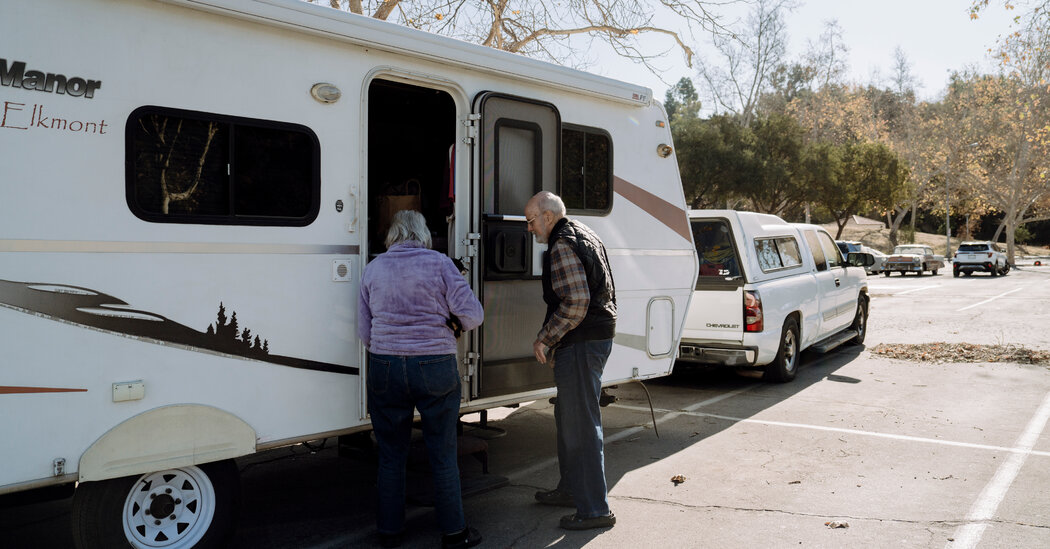Tens of thousands of wildfire evacuees in Los Angeles are now scrambling to find — and hold onto — temporary shelter, exacerbating the housing shortage in one of America’s least affordable cities.
With 105,000 people across Los Angeles still under evacuation orders on Monday, the displaced were scattered across Southern California, in shelter beds, hotel rooms, relatives’ spare rooms and friends’ couches, unsure about where to go next as extreme fire danger looms for yet another week.
The hunt for longer-term housing already has sparked bidding wars in some neighborhoods on the edges of the fires. In the ritzy Brentwood neighborhood adjacent to the Palisades fire, one real-estate agent suddenly got 1,000 applicants for a new rental listing. In Pasadena, a family whose home burned in the Eaton fire in Altadena said they were about to lose their emergency short-term rental where they have been staying since the fires to a family willing to pay $8,000 a month.
Some evacuees, like Lila King, have ended up staying in their vehicles.
Ms. King, 75, has been bouncing between motels and sleeping in her truck with her 40-year-old son since they were displaced by the Eaton fire.
Ms. King recently had surgery after she broke several ribs in a fall, and the nights sleeping in her truck have left her aching. She said she has been living off tacos from a nearby gas station, and wondering when, if ever, she will be able to return to her mobile home in Altadena, the unincorporated community at the foot of the San Gabriel Mountains that was devastated by the Eaton Fire.
“We’re trying to get some help to get a place,” she said. “I’m worried.”
The American Red Cross and other agencies have opened eight shelters in Los Angeles County capable of holding almost 800 evacuees combined; the largest, at the Pasadena Civic Auditorium Exhibition Hall, had almost 500 people.
Some displaced by the fires are crashing on couches and spare bedrooms with families and friends. Others are posted up for now in hotels and vacation rentals, anxiously counting the days before they have to find other housing.
“We’re scattered all over,” said Nic Arnzen, the vice chairman of the town council of Altadena.
Mr. Arnzen’s home was one of the more than 6,500 buildings in Altadena that burned down. Since the fire, he and his husband, their 18-year-old daughter and a family friend have squeezed into an Airbnb rental with their two dogs, cat and rabbit.
He said that nearly all of Altadena’s approximately 45,000 residents were displaced, and that the water contamination and toxic debris left by the fire would complicate efforts to return even for those whose homes survived. Some of his neighbors have moved in with family, friends and strangers nearby. Others have moved out of state, at least for now.
For many, the emotions and adrenaline of the initial aftermath have given way to the reality that longer-term accommodations must be found.
“We were already in a housing crisis,” Mr. Arnzen said. “Everybody’s scrambling for homes.”
Price gouging on rental housing and other goods and services is prohibited in California under an emergency declaration issued by Gov. Gavin Newsom. That means rents cannot be increased more than 10 percent compared with what they were at the start of the state of emergency.
But a review of active rental listings found some had risen anywhere from 15 percent to 64 percent since the fires.
Several families whose homes burned said they had been so immersed in the work of dealing with their insurance companies and trying to return home to assess the damage that they had not even started to look beyond the horizon of the next day.
“It’s like being lost in a fog,” said Godwin Amafa, 69, whose home of 25 years in Altadena burned down. He and his wife have been staying at a hotel in Pasadena and said the $140 nightly rate seemed reasonable, even with the surge of evacuees.
“I can be here as long as I can afford it,” he said.
Julio Partida, 58, and his family have spent a few days at an Airbnb in City Terrace, just east of downtown Los Angeles. Family and friends have offered space in their homes after that, but Mr. Partida said he did not know where his family would end up. It is still difficult, he said, to think about life beyond the short term.
“These aren’t things you prepare for,” he said.
Closer to the Rose Bowl Stadium, where the Colemans are parked, Parking Lot F has become an operations center, where firefighters and other law enforcement officials have been able to refuel and sleep.
The Colemans’ home in Altadena was spared, and for now, the couple said they were waiting for the fire risk to abate and an all-clear to re-enter their neighborhood. To pass the time, they’ve been checking their phones for news on the fires, and taking their three dogs — Trixie, Molly and Waldo — on walks.
“We’re just going to wait it out,” Ms. Coleman, 80, said.
Finn-Olaf Jones contributed reporting from Pacific Palisades, Mimi Dwyer from Pasadena and Christopher Flavelle contributed from Washington.
Checkout latest world news below links :
World News || Latest News || U.S. News
The post L.A. Wildfire Evacuees Scramble to Find Shelter, Exacerbating Housing Shortage appeared first on WorldNewsEra.

